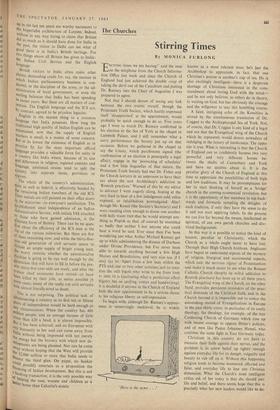The Churches
Stirring Times
By MONICA FURLONG
EXC1TING times we are having!' said the man on the telephone from the Church Informa- tion Office last week and since the Church of England had just achieved the double coup of taking the devil out of the Catechism and putting Dr. Ramsey into the Chair of Augustine I was prepared to agree.
Not that 1 should dream of seeing any link between the two events myself, though the Protestant Truth Society, which hastily expressed itself 'disappointed' at the appointment, would probably be quick enough to do so. Five years ago I went to watch Dr. Ramsey confirmed in his election to the See of York at the chapel in Lambeth Palace, and I still remember what a sorry performance the Society put up on that occasion. Before we gathered in the chapel to say the Litany, watch parchments signed (the confirmation of an election is principally a legal affair), engage in the 'porrecting of schedules' and a few little bagatelles of that nature, the Protestant Truth Society had met Dr. Fisher and the Church lawyers in an anteroom to have their say about the new Archbishop's addiction to 'Romish practices.' Warned of this by my editor in advance I went eagerly along, hoping at the very least to hear of a few indulgences sold, relics exposed, or infallibilities promulgated. Alas! though Mr. Kensit (the Society's Secretary) and I were standing close enough to douse one another with holy water (not that he would attempt any- thing as Popish as that, of course) he mumbled su badly that neither I nor anyone else could hear a word he said. Ever since then I've been wondering just what Arthur Michael Ramsey got up to while administering the diocese of Durham under Divine Providence, but I've never been able to unearth anything beyond a few High Masses and Benedictions, and very nice too, if I may say so. Apart from a few nuts within the PTS and one or two other societies, not to men- tion the odd bigots who write to me from time to time (it is fascinating what a pernicious effect bigotry has on spelling, syntax and handwriting), it is doubtful if anyone in the Church of England feels the new appointment to be a serious threat to his religious liberty or self-expression.
To begin with, although Dr. Ramsey's appear- ance is unnervingly medizeval, he is widely
'Here is 11w news . . .*
known as a most tolerant man; he's just the Archbishop to appreciate, in fact, that one Christian's poison is another's cup of tea. He is also excitingly intelligent—there is a desperate shortage of Christians interested in the com- mandment about loving God with the mind— and he not only believes, as others do in theory, in waiting on God, but has obviously the courage and the willpower to stay this humbling course. A faint, intriguing echo of the Kensitites is stirred by the simultaneous translation of Dr.
Coggan to the Archiepiscopal See of York. Not, of course, that Dr. Coggan is any kind of a bigot and not that the Evangelical wing of the Church which he represents would dream nowadays of indulging in the luxury of intolerance. The oppo- site is true. What is interesting is that the Church of England can so confidently harness two very powerful and very different horses be- tween the shafts of Canterbury and York and have no qualms about it. It is the peculiar glory of the Church of England at this time to appreciate the possibilities of both high and low traditions. It may be presumptuous for her to start thinking of herself as , a 'bridge' church in the coming ecumenical revolution, but i: is the opportunity of her members to nip back- wards and forwards sampling the delights of each tradition, if only they have the sense to do it and not start applying labels. In the process we can live far beyond the means, intellectual or spiritual, of our own parish churches and doc- trinal backgrounds.
In this way it is possible to notice the kind of tension, peculiar to Christianity, which the Church as a whole. ought never to have lost.
Through their High Church brethren, Anglicans have begun to understand aspects of the mystery of religion, liturgical and sacramental aspects, which ease the nervous rigour of Protestantism and make it much easier to see what the Roman Catholic Church (despite its wilful addiction to Romish practices) has been up to all these years. The Evangelical wing of the Church, on the other hand, provides persistent reminders of the prac- tical demands of the Christian faith, and in the Church beyond it is impossible not to notice the astonishing record of Evangelicalism in Europe in the past thirty years; in particular of its costly theology, the theology, for example, of the tiny Confessing Church of Germany which rose up with insane courage to oppose Hitler's policies, and of men like Pastor Johannes Hamel, who continue the same fight in East Germany today. Christians in this country do not have to measure their faith against their nerves, and the problem is to screw belief up. tightly enough against everyday life for its danger, vulgarity and beauty to rub off on it. Without this happening religion tends to become mannered, affected and false, and everyday life to lose any Christian dimension. What the Church's most intelligent critics ask of her today is that she should pair life and belief, and there seems hope that this is precisely what her new leaders would like to do.










































 Previous page
Previous page